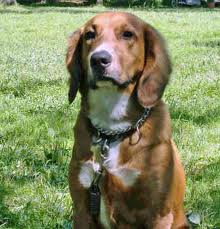The Hertha Pointer is a large-sized Danish pointing type of gundog used in finding upland small and big game. This rare and versatile hunting dog was developed in 1864 by breeding an English Pointer with an orange-red pointer called Hertha, brought by Danish soldiers, after the end of the war between Denmark and Germany. Hertha most likely belonged to the Duke of Augustengorg s kennels. Although it is a popular breed in Denmark, due to its excellent innate hunting/pointing abilities, devotion and its loveable disposition, it is pretty hard to find it outside its country of origin. This breed was officially recognized in Denmark in 1897, but it is still not recognized by the AKC.

In terms of general appearance, the Hertha Pointer has a robust and well-developed muscular body, a classic pointer head, medium-sized muzzle, chestnut-colored eyes, flappy ears, of medium length, which are set on high, black nose, muscular and strong legs, powerful back, broad deep chest with well-sprung ribs, which gives it an athletic appearance and a medium length tail. Its coat is short, straight and smooth, just like any pointer s. The colors of the coat include orange, yellow or golden, light brown and dark brown, typically with white markings on its muzzle, chest, legs and the tip of its tail. The average height of this breed is 23-26 inches and its average weight is 45-65 pounds.
This Danish breed is high-spirited, yet affectionate, congenial, gentle, loving and with a stable temperament, very loyal and eager to please its human family. In addition to being the consummate hunting dog, it is also a good watchdog and guard dog and a loving and playful family companion. They are happiest living indoors, as they enjoy being couch potatoes as well as participating in all the familys activities, because they thrive on attention and love from its family members. By nature, this breed is non-aggressive and it is excellent with children, other dogs and smaller pets.
This galloping breed requires plenty of space and regular exercise, preferably off leash, to maintain optimum health. As long as its daily needs of exercise are met, this energetic dog is suitable to live in an apartment. If kept outdoors, the courtyard needs to be properly fenced, in order to prevent it from picking up a scent and wandering off. Also, it is best to be kept indoors during the cold season, due to its short coat. This hardy and tenacious breed should not be left unattended for too long.
This dog is easily trained, especially if the owner trains it, because it is very intelligent, obedient, reliable, cooperative and extremely attached to and dependent on its master. This compact and alert breed is very low maintenance, because its fine and shiny coat requires only a soft brush weekly. It is quite wary of strangers, although it does not bark excessively. Like all hunting breeds, its coat should be checked for ticks.
In terms of health, this breed is genetically quite healthy, although it may suffer from allergies, gastric torsion, ear infections and hip dysplasia. Vigorous physical activity is essential to the well-being of this versatile breed, but it should never be exercised immediately after a meal. A proper diet for active dogs is advised. It also loves water and it is highly adaptable to any environment.
If you adopt a Hertha Pointer, you will get an exceptional hunting dog and an even-tempered, friendly, well-behaved, loving and devoted companion that will complete your family.




